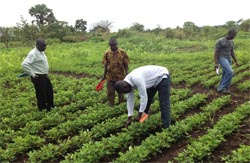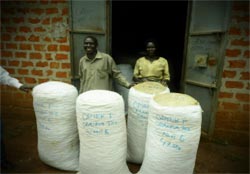Smallholder farmers have started embracing knowledge gained from the N2Africa project to improve groundnut production in Minakulu, Oyam district, Northern Uganda. World Vision Uganda engaged with 60 smallholder farmers to improve their skills on field agronomic practices for soyabean and groundnut production using a farmer field school approach. Using small demonstration plots, the participating farmers learned about responses of improved groundnut varieties SERENUT 5 and SERENUT 6 to P-fertilizer and gypsum over the two seasons of 2013. Farmers preferred SERENUT 5 to SERENUT 6 variety because of its reddish color and better yield.
|
In the last season (2014A), half of the farmers applied the techniques and skills they gained from the World Vision. Each of them used two bags to plant an acre and harvested on average 5 bags (unshelled is 50 kg). Farmer Rose Mary Ayo said that "proper spacing, good variety and early weeding is what enabled us to get good yield. Traditionally we believe that early weeding causes stunting of groundnuts, so farmers would leave weeding up until late in the season. Now we know that this significantly affects yields". |
World Vision’s Farmer field school facilitator (bending) examining groundnut pegging on one the on-farm demonstration trials in Minakulu Variety demonstrations |
|
Francis Odyek and his wife harvested seven bags from half an acre and attributed the good yield to good variety, proper spacing and early weeding |
Now that they know how to obtain a good harvest, Rose Mary Ayo’s husband, Francis Odyek, notes that the main challenge is accessing markets. World Vision organized an exposure visit to VECO in Eastern Uganda to learn about collective marketing. Francis Odyek believes this is going to help them, because "we need linkages to the markets and we hope N2Africa will help us on this". Following the visit to VECO, they have begun to bulk groundnut. From last season’s harvest, they collectively had 80 bags brought into the store. So far, they sold 30 bags locally |
Despite the enthusiasm of the farmers, use of fertilizer is still negligible. One 50 kg bag of TSP costs 150,000 Ush. In addition, it is not easily found in the area. N2Africa continues to address this challenge and aims for innovative solutions.
By Aron Othieno, N2Africa Field Liaison Officer, Northern Uganda region


